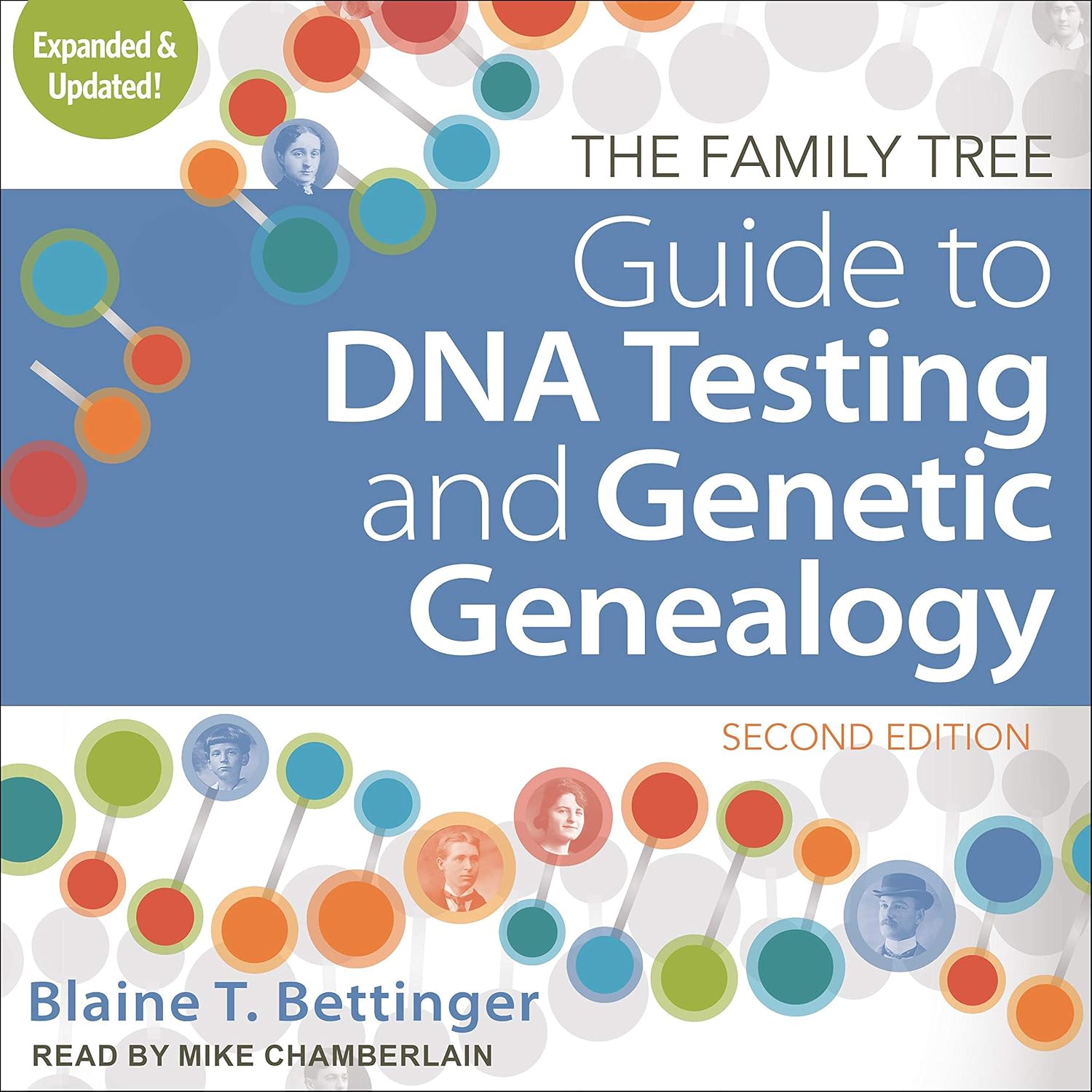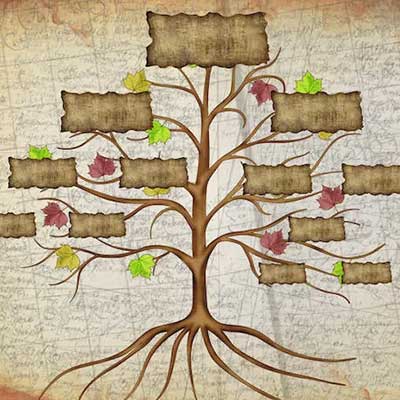- Home
- African American Stories
- Researching African American Genealogy
Researching African American Genealogy
Discovering your family's history can be an exciting and rewarding journey. This article will explore the world of researching African American genealogy and provide valuable tips and resources to help you trace your ancestors. From understanding slavery-era records to leveraging DNA testing, we will guide you toward uncovering the rich tapestry of your heritage. Let's embark on this fascinating exploration together!
Understanding the Basics of Genealogy
Defining Genealogy
Genealogy is studying and tracing an individual's lineage, family history, and ancestral connections. It involves researching and documenting one's family tree, including information about their ancestors, relationships, and other pertinent details. Genealogy allows individuals to gain a deeper understanding of their roots and heritage, connecting them to their past and providing a sense of identity and belonging.
Importance of Researching African American Genealogy
Researching African American genealogy holds immense significance due to the unique historical context of African Americans in the United States. Many African Americans face challenges when tracing their ancestry due to the painful legacy of slavery, which often resulted in fragmented family records. By undertaking genealogical research, African Americans can reclaim their lost history, uncover stories of resilience and strength, and establish connections to their ancestors.
Understanding one's African American genealogy is crucial for bridging the gaps in historical knowledge and addressing issues such as identity, cultural heritage, and social justice. It helps individuals learn about the sacrifices and struggles endured by their ancestors, fostering a sense of empowerment and pride in their heritage.
Common Challenges in Tracing African American Ancestors
Tracing African American ancestors can be a complex and challenging task due to historical factors and limited records. The enslavement of African Americans from the 17th to the 19th century often erased their identities, making it difficult to establish definite family connections. Some common challenges faced in researching African American genealogy include:
- Lack of access to vital records: During enslavement, African Americans were often denied legal rights and subjected to dehumanization, which resulted in a lack of vital records such as birth certificates, marriage licenses, and death records.
- Fragmented family records: Families were often separated during slavery, resulting in fragmented family records and lost connections. The transatlantic slave trade and forced migration are further complicated tracing African American ancestry.
- Restricted access to educational opportunities: Historically, African Americans were denied access to education and literacy, which limited their ability to document personal information and maintain thorough family records.
- Name changes and renaming: Enslaved individuals were frequently given new names by enslavers, leading to difficulties in tracing lineages. Often, enslaved African Americans had to change names after emancipation or to evade persecution, further complicating genealogical research.
Despite these challenges, with careful research, utilization of various resources, and a deep understanding of African American history, it is possible to make significant progress in tracing African American ancestors.
Getting Started with Your Researching African American Genealogy
How to Begin Your Research
When embarking on your African American genealogy research journey, it is essential to start by gathering as much information as possible from your immediate family. Begin by interviewing older relatives and gathering family stories, anecdotes, and any previously collected genealogical information. This initial step will provide a foundation for your research and help you understand which paths to explore.
Once you have gathered information from your relatives, plan and set clear research goals. Decide what specific aspects of your family history you want to explore, such as finding the origins of a particular ancestor or establishing connections to other relatives. Setting clear goals will guide your research and help you stay focused.
Gathering Information About Your Ancestors
To find out your African American ancestry, you can begin by collecting basic information about your direct ancestors, such as their full names, birth dates, marriage dates, and places of residence. This information will act as a starting point for further research. Consult family documents, photographs, and family trees to gather additional details.
Apart from immediate relatives, reaching out to extended family members who may have more knowledge or documents related to your ancestors can be helpful. They may have photographs, letters, or other family heirlooms that can provide valuable insights into your family history.
Finding Potential Family Accounts and Documents
In your search for African American ancestry, exploring family accounts and documents that might offer clues about your ancestors is crucial. Look for family Bibles, journals, letters, and photo albums containing written or visual evidence of your ancestors' lives. Please pay attention to any names, locations, or other details mentioned in these sources, as they can lead you to further records.
Also, could you reach out to historical societies, libraries, and archives in the areas where your ancestors lived? They may hold resources and collections specific to African American genealogy that can help your research. Online resources, such as genealogy websites and forums, can also provide valuable insights and connect you with others with similar research interests.
By gathering information about your ancestors and exploring various family documents and accounts, you can begin to piece together the puzzle of your African American genealogy.
Understanding Federal Population Censuses
Role of Census Records in Genealogical Research
Federal population censuses serve as fundamental sources of information for genealogical research, offering a comprehensive snapshot of the population at different points in history. Census records provide vital details such as individual names, ages, occupations, birthplaces, and other familial relationships, enabling researchers to construct their family trees and gain insights into their ancestors' lives.
The information gathered in census records can help researchers track migration patterns, identify family members, and establish connections to other individuals or families. Census data is crucial in establishing an individual's life timeline, especially when other records might be scarce.
How to Find and Use Census Data
To access and utilize census data effectively, it is crucial to understand how to navigate different census years and the information they provide. The United States federal census has been conducted every ten years since 1790, with records available for public access after 72 years.
Start by identifying the specific census years relevant to your research. Determine the approximate time period when your ancestors were alive and cross-reference it with the available census records. Utilize online resources and databases that access digitized census records, such as Ancestry.com, FamilySearch.org, and the National Archives website.
Once you have found the relevant census records, carefully examine the information provided and make note of any details that match your ancestors' known information. Pay attention to variations in name spellings, age discrepancies, and other potential errors that may have occurred during data collection or transcription. These discrepancies can provide valuable clues for further research.
Challenges Specific to African American Research in Census Records
While census records serve as crucial resources for genealogical research, there are specific challenges when tracing African American ancestry using this data. Due to the legacy of slavery and racial discrimination, African American individuals were often excluded from official census records or misrepresented.
During the antebellum period, census records did not typically record enslaved by the name African Americans. Instead, they were often listed as numbers or under the names of their owners. After emancipation, African Americans faced continued challenges in being accurately counted in census records due to racial prejudice and systemic barriers.
When using census records for African American genealogical research, it is essential to employ alternative research strategies, such as examining records related to the Freedmen's Bureau, slave schedules, and other relevant documents. Using a combination of census records and other resources, researchers can maximize their chances of successfully tracing African American ancestors.
Researching African-American Slave Ancestors
Finding Slave Schedules
To trace African American ancestors who were enslaved, researchers can utilize slave schedules. Slave schedules were explicitly created for the United States census from 1850 to 1860. They provided information about slaveholders, the number of enslaved people owned, and the age and gender categories of enslaved individuals. This information can offer valuable insights into the lives of enslaved African Americans and potential leads for further research.
Search for slave schedules in the census records for the relevant years and locations. Examine the names of slaveholders surrounding your ancestors' potential locations to identify possible connections. Analyzing these records can help researchers establish links between enslaved individuals and their owners, leading to further genealogical discoveries.
Researching Enslavers for Leads
While researching African American slave ancestors, tracing the enslavers can often provide significant leads. By finding and exploring the records of enslavers, researchers can uncover additional information about their ancestors' lives, including family connections and potential documentation related to their enslavement.
Look for wills, probate records, and estate records that may mention enslaved individuals by name or provide information about their relationships. Slaveholders often listed enslaved individuals in their wills or estate inventories, offering researchers valuable clues to follow. Other records, such as plantation records, tax lists, and court records, can also provide insights into enslaved individuals' and owners' lives.
Using Wills and Estate Records
Wills and estate records can be particularly valuable in tracing African American ancestors who were enslaved. These records often contain information about property division, including enslaved individuals, among family members or heirs. By examining wills and estate records, researchers can identify potential family connections, discover ancestral names, and gain insights into the lives of their enslaved ancestors.
Look for wills and estate records in local county courthouses, historical archives, or online repositories that specialize in genealogical research. Please pay attention to any references to enslaved individuals, their ages, and familial relationships. Cross-reference this information with other sources to confirm and validate your findings.
Researching African American slave ancestors requires meticulous examination of various records and resources to piece together the puzzle of their lives and establish connections to their descendants.
Exploring African American Military Records
African American Participation in Various Wars
Throughout the history of the United States, African Americans have contributed significantly to various wars despite facing racial discrimination and adversity. From the Revolutionary War to the Civil War, World Wars I and II, and subsequent conflicts, African Americans have served in the military with courage and resilience.
Understanding your African American ancestors' military service can provide valuable insights into their lives, experiences, and potential familial connections. Research the specific wars and periods in which your ancestors might have served to uncover military records and related documents.
Sources of African American Military Records
To explore African American military records, examine the National Archives and Records Administration (NARA) holdings, which include service records, pension records, muster rolls, and other relevant documents from different wars. The NARA website provides access to digitized records and guidance on accessing physical records.
contact local, state, and regional archives or historical societies. They may hold collections or resources specifically related to African American military service. Utilize online databases, such as Fold3, which specializes in military records, and Ancestry.com, which houses various military collections.
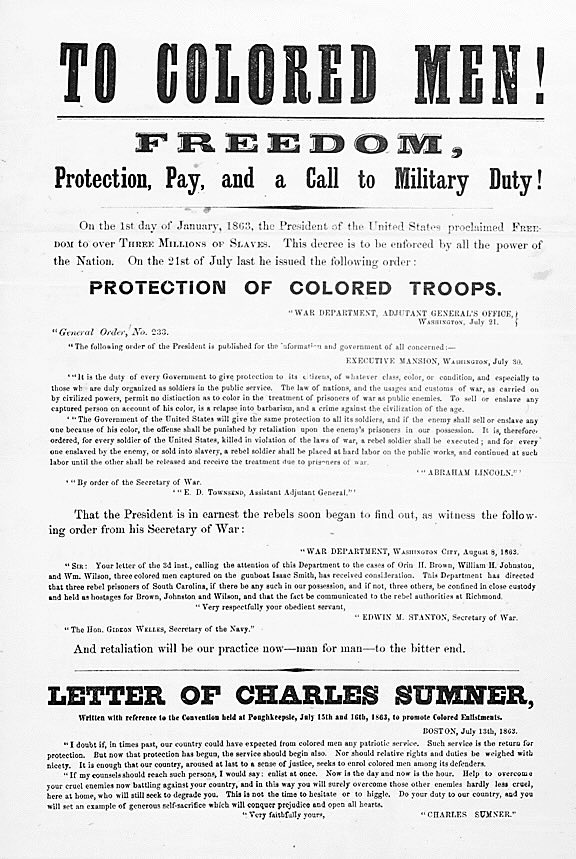 United States Colored Troops recruitment flyer
United States Colored Troops recruitment flyerTranslating Military Records into Ancestral Information
When analyzing military records, it is essential to understand how to translate the information into ancestral details. Pay attention to the enlisted person's name, age, birthplace, occupation, and any other demographic information provided. Cross-reference this information with other records to build a comprehensive picture of your ancestor's life.
Military records often include dates of enlistment, discharge, battles participated in, and potential pension applications. Utilize this information to establish a timeline of your ancestor's military service and potentially locate additional records or accounts related to their experiences.
By exploring African American military records, researchers can shed light on their ancestors' military service and the impact of their contributions to the nation's history.
Exploring Freedmen's Bureau Records
History and Purpose of the Freedmen's Bureau
The Freedmen's Bureau, officially known as the Bureau of Refugees, Freedmen, and Abandoned Lands, was established by Congress in 1865 to assist newly emancipated African Americans in transitioning from slavery to freedom. The Bureau provided various aid forms, including education, employment, medical care, and land distribution.
The Freedmen's Bureau also generated an extensive collection of records that can be invaluable in African American genealogical research. These records document the lives and experiences of formerly enslaved individuals, including marriage records, labor contracts, financial records, and school records.
The records generated by the Freedmen's Bureau cover a wide range of topics. They can provide crucial information for tracing African American ancestry. Some key types of records include:
- Marriage records: The Freedmen's Bureau recorded marriages between formerly enslaved individuals to legalize their unions. These records often provide names, ages, birthplaces, and the names of spouses and parents.
- Labor contracts: The Bureau facilitated labor contracts between formerly enslaved individuals and their employers. These documents can shed light on the work conditions, wages, and terms of employment, revealing insights into the lives of African American ancestors.
- School records: The Freedmen's Bureau established schools for formerly enslaved individuals, including children and adults. School records may include attendance logs, teacher reports, and student transcripts, offering valuable information about education and literacy levels.
- Correspondence and reports: The Bureau generated correspondence and reports related to its activities and the conditions of freedmen. These documents may provide contextual information about the lives of African Americans during this period, as well as potential insights into specific individuals or communities.
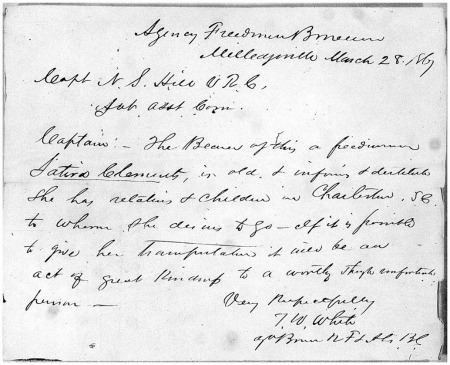 Transport of Old Freedwoman from Milledgeville, GA to Charleston, SC
Transport of Old Freedwoman from Milledgeville, GA to Charleston, SCHow to Access These Records
Accessing Freedmen's Bureau records requires understanding the available resources and repositories. You can start by visiting the National Archives website, where you can find an overview and guidance on accessing the records. The National Archives also lists regional archives and research facilities holding Freedmen's Bureau records.
Besides the National Archives, explore online databases and repositories, such as FamilySearch.org and Ancestry.com, which provide access to digitized Freedmen's Bureau records. Local and state archives may also hold relevant records, especially in areas with a significant African American population during Reconstruction.
Exploring the Freedmen's Bureau records offers a unique opportunity to delve into the lives of formerly enslaved African Americans and gain a deeper understanding of their experiences and achievements.
Using African American Church Records
Role of Church in African American Culture and History
Churches have played a significant role in African American culture and history. During slavery and the post-emancipation period, churches became spaces of community, identity formation, resistance, and social support. African American churches often served as more than places of worship, functioning as schools, meeting places, and centers for civil rights activism.
Given the central role of churches in African American communities, church records can be invaluable for genealogical research. These records often provide detailed information about baptisms, marriages, burials, and other significant events, enabling researchers to trace their African American ancestry.
Types of Records Available
African American church records can offer a wealth of information about individual ancestors and their families. Some common types of records found in church archives include:
- Baptismal records: Baptismal records document individuals' baptisms, providing their names, birth dates, parents' names, and sometimes sponsors or godparents. These records can be particularly useful for establishing familial connections and tracing ancestral lines.
- Marriage records: Church marriage records provide valuable information about individuals' marriages, including the names of the bride and groom, the wedding date, and sometimes the names of witnesses or parents. These records can confirm relationships and help in constructing family trees.
- Burial records: Church burial records document individuals' deaths and burials. They generally include names, death dates, and burial locations. These records can help researchers establish vital dates and locations for their ancestors.
- Membership lists and meeting minutes: Church records often include membership lists and meeting minutes that can provide insights into individuals' involvement in the church and community. These records may mention activities, committee memberships, or participation in church events.
How to Access Church Records
Accessing African American church records typically requires communication and collaboration with local churches and denominational archives. African American churches maintain their records, so contacting the relevant congregation or local church authorities is essential.
To find information about specific churches and their historical records, consult local historical societies, genealogical societies, or state and regional archives. These organizations often maintain collections of church records or can provide guidance on accessing them. Online databases and genealogy websites focused on African American research may also have digitized church records or indexes available.
Careful examination of African American church records can offer unique insights into ancestors' lives, religious affiliations, and community involvement, enriching your understanding of their place within African American history.
Analyzing African American DNA for Genealogy
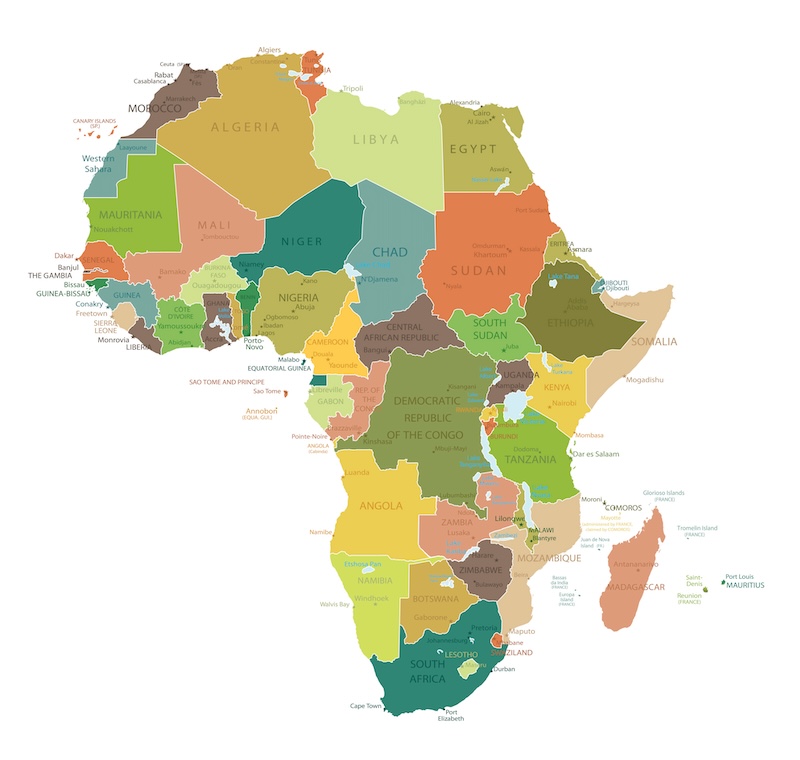
Incorporating DNA Testing into Your Research
DNA testing has revolutionized genealogical research, providing individuals with new tools to explore their ancestral connections. For African Americans who face challenges in traditional research methodologies, DNA testing offers an additional avenue for uncovering their genetic heritage and establishing connections with distant relatives.
Incorporating DNA testing into your genealogical research involves choosing the right type of DNA test, such as autosomal DNA, Y-DNA, or mitochondrial DNA. Autosomal DNA testing is the most commonly used test for genealogical purposes, providing information about both paternal and maternal lines.
Understanding African American DNA Results
When DNA testing, it is crucial to understand how to interpret and analyze the results. DNA results typically provide a breakdown of one's ethnic origins, showing the percentage of different population groups in an individual's DNA. For African Americans, these results can provide insights into the diverse African, European, and Native American ancestral contributions.
However, it is essential to remember that DNA testing does not provide detailed family trees or direct connections to specific ancestors. Instead, it identifies genetic matches and potential relatives who share segments of DNA. Collaborating with genetic matches, analyzing shared DNA segments, and combining DNA data with traditional genealogical research is often necessary to make meaningful connections.
Resolving Ancestral Mysteries through DNA Testing
DNA testing can help resolve ancestral mysteries and provide new leads for further research. When combined with traditional research techniques, DNA results can help in:
- Identifying shared ancestors: DNA matches can establish connections to distant relatives who may hold valuable information or documentation about shared ancestors.
- Validating research findings: DNA testing can confirm or challenge existing genealogical research, offering a more comprehensive understanding of ancestral connections.
- Uncovering hidden connections: DNA testing can reveal unexpected genetic matches, leading to discoveries of previously unknown biological relationships or family branches.
- Researching specific lines: DNA tests specific to paternal or maternal lines, such as Y-DNA or mitochondrial DNA testing, can provide insights into deep ancestral connections and migrations.
As DNA testing becomes increasingly accessible and affordable, incorporating it into African American genealogical research can enhance understanding and bridge gaps in ancestral knowledge.
Utilizing Online Resources and Databases
Top Online Sites for African American Genealogy
The internet has revolutionized genealogical research, providing access to various online resources and databases catering to African American genealogy. Some top online sites for African American genealogy research include:
- Ancestry.com: Ancestry.com offers a comprehensive collection of genealogical records, including census, vital, military, and other relevant documents. It provides access to extensive databases specifically focused on African American ancestry.
- FamilySearch.org: FamilySearch.org, operated by The Church of Jesus Christ of Latter-day Saints, offers a vast collection of digitized records, including census, vital, and military records. It provides free access to resources, making it an invaluable tool for African American genealogical research.
- African American Genealogy at the National Archives: The National Archives website hosts extensive resources dedicated to African American genealogy. It offers databases, research guidance, and access to records from the National Archives and Records Administration (NARA).
Effective Search Strategies
When utilizing online resources for African American genealogy, it is essential to employ effective search strategies to maximize the chances of success. To improve search results:
- Start with known information: Begin your search with information gathered from family and other sources. Use names, dates, and locations to narrow down search parameters.
- Utilize filters and advanced search options: Online databases often provide filters and advanced search options. Take advantage of these features to refine your search and focus on relevant results.
- Try alternative spelling variations: Due to historical factors, names and spellings can vary significantly in African American genealogical records. Try different variations and common misspellings of names to increase the likelihood of finding relevant records.
- Explore relevant record collections: Online resources often have specific collections dedicated to African American genealogy. Explore these collections to find records and databases tailored to your research needs.
Result Verification and Cross-checking
While online resources provide valuable convenience and access to genealogical records, verifying and cross-checking any findings is crucial. Relying solely on online information can lead to errors and inaccuracies.
Verify information by consulting multiple sources, such as physical documents, original records, and specialized repositories. Collaborate with experienced researchers, genealogical societies, and online forums to ensure accuracy and reliability.
Cross-checking information from different sources and databases helps to establish the credibility of findings and provides a more comprehensive understanding of your African American ancestry.
Final Steps and Creating Your Family Tree
Organizing Your Findings
Once you have conducted extensive research and gathered a wealth of information about your African American ancestry, it is essential to organize your findings effectively. Developing an organization system tailored to your research style and preferences will facilitate easy retrieval and analysis of data.
Consider using genealogy software or online platforms specifically designed for creating family trees and organizing genealogical research. These tools offer features such as data entry, archival storage, and visualization options that enable you to structure your findings in a logical and visually appealing manner.
Creating a Visual Family Tree
One of the most exciting aspects of genealogical research is visualizing your ancestral connections and creating a family tree. A visual family tree allows you to understand the relationships between different individuals. It helps convey your family's history to future generations.
Explore various options for creating visual family trees through online platforms, genealogy software, or traditional methods such as hand-drawn charts. Choose a format that suits your preferences and enables you to showcase the depth and richness of your African American ancestry.
Sharing and Preserving Your Family History
Sharing and preserving your family history is a crucial step after completing extensive genealogical research. By sharing your findings with relatives and future generations, you preserve your family's heritage and ensure that your ancestors' stories continue to be passed down.
Consider sharing your research through family gatherings, reunions, or online platforms that facilitate sharing family trees and research. Preserve physical documents, photographs, and artifacts in archival-quality storage to safeguard them for future reference.
Just to remind you, genealogical research is ongoing. As you encounter new information or discover additional resources, be open to revisiting and expanding your research. Exploring African American genealogy is a journey that helps reclaim lost history, honor ancestors, and forge connections to the past.



